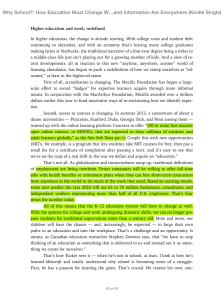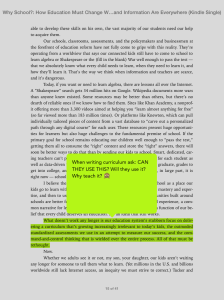As I began to read Will Richardson’s Why School? this week, he presents the ongoing conversation of education reform in a way that makes it hard to argue to with him. Education reform has taken many forms over the years, and this conversation will likely never end since parents, educators and politicians always seem to know what’s best (better) for our kids. Richardson tells his side using his own teenage son as evidence of how our youth has taken their learning into their own hands, because they can.
Traditionally, the role of educators was to prepare students for the outside world; educate them on what they need to know to land a job and how to survive in our developing society. Because the job market has changed significantly (see image 1), so should the standards. Richardson points out that in 2020, there will be close to 70 million freelancers, consultants and independent workers representing our employed population. As of today, our schools are not utilizing standards that prepare our students for this future.
(Image 1)
Richardson speaks a lot about the “test” we demand students pass in order to prove they have mastered content. He explains that often the results and data taken from these tests are used to measure how intelligent our students are in America. His argument is that this “test” inaccurately measures both of these. We are currently offering students a curriculum that is no longer relevant, Richardson believes we need to rethink this. This caused me to think about the curriculum I offered my students last year: Was it relevant? Did they need it? Image 2 highlights a reminder to myself when writing curriculum: Can they use this? Will they use this? Why teach it? Asking these questions as I prepare modules for my high school students will help me reflect on the intention behind my own curriculum, ensuring that content is focused and relevant.
(Image 2)
Using my iPad this week to being Why School? went smoothly. Other than having to charge up the battery from nothing again, there were no road bumps in my experience. I continue to look forward to the time I set aside to read eTexts on my iPad since it is still a new experience that I am settling into. Since this is my final text for this course, I have began to think about what texts I will purchase off of the Kindle app next. I cannot strictly convert to e-reading but I certainly will continue to supplement with it.
Richardson, W. (2012). Why school? How education must change when learning and information are everywhere (TED Books) [Kindle]. Retrieved July, 2014.


